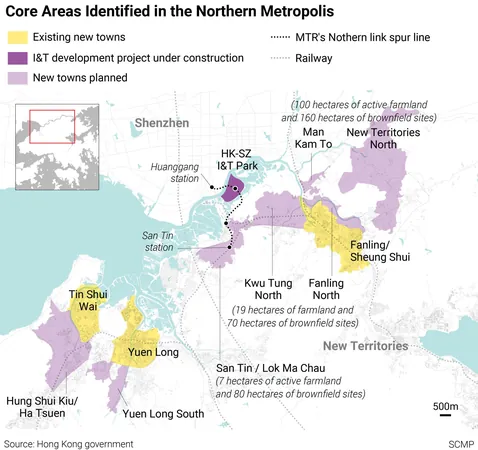
Reform: The Key to Unlocking Hong Kong's Prosperous Future Amidst Turbulence
2024-12-22
Author: Kai
As Hong Kong stands at a crossroads, the call for reform has become more pressing than ever. With the city’s economy facing turbulence and shifting global dynamics brought on by events like the recent US elections, the time for strategic transformation is now. It's imperative for Hong Kong to shift its focus from past achievements to pioneering new pathways for growth and resilience.
Historically, Hong Kong was upheld as a beacon of laissez-faire capitalism, but the winds of change are blowing, necessitating a careful balancing act between government intervention and free-market dynamics. Policymakers must navigate a complex landscape where traditional economic models no longer suffice.
This shift isn't merely theoretical; it’s evident in global trends. The recent changes in the United States, where government support for key industries is resurfacing through initiatives like the CHIPS and Science and Technology Innovation Cooperation Zone, highlight a move toward a more interventionist approach in capitalism. Such models could provide important lessons for Hong Kong, where targeted government support could help invigorate crucial sectors and maintain the city’s competitive edge.
Moreover, Hong Kong's integration within the Greater Bay Area offers a unique opportunity to cement its status as a leading global city. By collaborating actively with neighboring cities like Shenzhen, Hong Kong can become a pivotal player in the economy of the region. Strategic initiatives such as the Hetao Shenzhen-Hong Kong Science and Technology Innovation Cooperation Zone are vital catalysts for this transformation, opening doors for new business opportunities and joint ventures that leverage the strengths of both cities.
Hong Kong's educational institutions are already recognized globally, with several universities ranked among the top 100 worldwide, reflecting the city’s potential in research and innovation. However, to truly compete with titans like San Francisco and New York, it must urgently bolster its research capabilities and attract a diverse pool of talent, including Nobel laureates. One effective way to achieve this is by maintaining a legal environment that encourages international collaboration and investment, particularly in technology-focused regions like Qianhai and Hetao.
As we step into the age of artificial intelligence (AI), Hong Kong finds itself uniquely positioned to reap benefits from this revolution. The establishment of an AI supercomputing center, alongside a significant financial commitment from the government, exemplifies a strong foundation for growth in this field. With a burgeoning ecosystem of start-ups and a favorable venture capital climate, Hong Kong must double down on its efforts to attract talent and investment in AI, ensuring it doesn't lag behind other global powerhouses.
In conclusion, the dawn of reform in Hong Kong is not just a response to external pressures; it’s a strategic imperative. The city must embark on a bold new journey that integrates innovative economic policies, nurtures international partnerships, and emphasizes technological advancement. The future of Hong Kong hinges on decisive actions taken today — a pathway that could lead to renewed vibrancy and resilience for this iconic city in the years ahead.
As we watch closely, the question remains: will Hong Kong rise to the occasion and redefine its destiny in a rapidly evolving world?




 Brasil (PT)
Brasil (PT)
 Canada (EN)
Canada (EN)
 Chile (ES)
Chile (ES)
 España (ES)
España (ES)
 France (FR)
France (FR)
 Hong Kong (EN)
Hong Kong (EN)
 Italia (IT)
Italia (IT)
 日本 (JA)
日本 (JA)
 Magyarország (HU)
Magyarország (HU)
 Norge (NO)
Norge (NO)
 Polska (PL)
Polska (PL)
 Schweiz (DE)
Schweiz (DE)
 Singapore (EN)
Singapore (EN)
 Sverige (SV)
Sverige (SV)
 Suomi (FI)
Suomi (FI)
 Türkiye (TR)
Türkiye (TR)